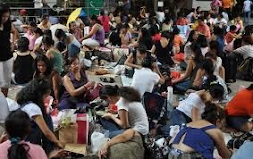Mr. Ferdinand R. Marcos, Jr.
President
Republic of the Philippines
The Malacañang Palace
August 29, 2024
Ilocos Sur National High School
Mr. President:
Greetings, sir! I hope this letter finds you well.
I'm writing this letter to extend my gratitude and gratefulness for everything that you've done to our country. I hope that every plans and advocacies you promised to every Filipino people will be implemented very well. I am looking forward to more improvements and innovations in our country, so that we could catch up to the current technology.
I hope that as time pass by we could solve our problem in inflation and help our farmers more. And improve the education to balance everything. I also hope that every Filipino children receives every right that they should have.
I am looking forward to your positive consideration with this letter. Thank you and may God bless you, sir!
Sincerely Yours.








